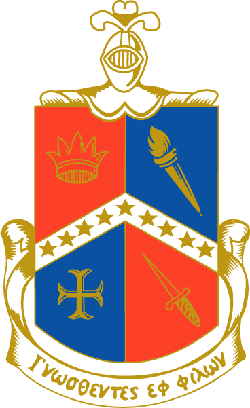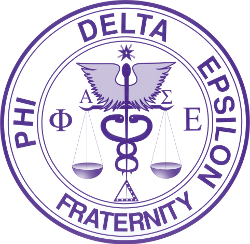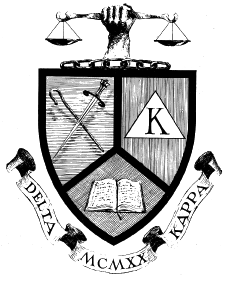
The Association of College Honor Societies (ACHS) is a voluntary association of national collegiate and post-graduate honor societies.

Alpha Delta Gamma (ΑΔΓ), commonly known as ADG, is an American Greek-letter Catholic social fraternity and one of 75 members of the North American Interfraternity Conference (NIC). Based on Christian principles and the traditions of the Jesuit Order of the Catholic Church, Alpha Delta Gamma was founded at Loyola University Chicago on October 10, 1924, as a response to the unwillingness of most national fraternities to colonize at Catholic colleges and universities.

Delta Phi Epsilon is an international sorority founded on March 17, 1917 at New York University Law School in Manhattan. It is one of 26 social sororities that form the National Panhellenic Conference (NPC). It has 110 active chapters, three of which are located in Canada, making the sorority an international organization.
While most of the traditional women's fraternities or sororities were founded decades before the start of the 20th century, the first ever specifically Christian-themed Greek Letter Organization formed was the Kappa Phi Club, founded in Kansas in 1916. Kappa Phi was a women's sisterhood that developed out of a bible study and remains one of the largest nationally present Christian women's collegiate clubs today. Later organizations added more defined social programming along with a Christian emphasis, bridging the gap between non-secular traditional sororities and church-sponsored bible study groups, campus ministries and sect-based clubs and study groups.

Theta Upsilon Omega (ΘΥΩ), was a national collegiate fraternity in the United States. It was formed by the merger of nine local fraternities in 1924. On April 23, 1938, Theta Upsilon Omega merged with Sigma Phi Epsilon.

Phi Delta Epsilon (ΦΔΕ) is a co-ed international medical fraternity founded at Cornell Medical College and a member of the Professional Fraternity Association.
Phi Omega Pi (ΦΩΠ) was a national collegiate sorority operating in the United States from 1922 until 1946, when its chapters were absorbed by several larger sororities, and merged with the national sorority, Delta Zeta.
The expansion of Greek letter organizations into Canada was an important stage of the North American fraternity movement, beginning in 1879 with the establishment of a chapter of Zeta Psi at the University of Toronto. In 1883, the same fraternity established a chapter at McGill University. Other early foundations were Kappa Alpha Society at Toronto in 1892 and at McGill in 1899, and Alpha Delta Phi at Toronto in 1893 and at McGill in 1897. The first sorority, Kappa Alpha Theta, was established in Toronto in 1887. In 1902, the first international chapter of Phi Delta Theta was established at McGill University as the Quebec Alpha.

Delta Kappa Fraternity (ΔΚ) was an American national fraternity that existed from 1920 to 1964.

Fraternities and sororities at the University of Virginia include the collegiate organizations on the grounds of the University of Virginia in Charlottesville, Virginia. First founded in the 1850s with the establishment of several fraternities, the system has since expanded to include sororities, professional organizations, service fraternities, honor fraternities, and cultural organizations. Fraternities and sororities have been significant to the history of the University of Virginia, including the founding of two national fraternities Kappa Sigma (ΚΣ) and Pi Kappa Alpha (ΠΚΑ).

Theta Sigma Upsilon (ΘΣΥ) was an American sorority founded on March 25, 1921 at Emporia State University. It chartered 23 chapters in the United States. The sorority merged with Alpha Gamma Delta on June 29, 1959.

Kappa Phi Kappa (ΚΦΚ) is an American professional fraternity for students in education. It was organized in 1922 at Dartmouth College. It currently has one active chapter at Ohio State University.
Adele Gerard Lewis Grant was an American botanist, academic, and plant collector. She founded the Prytanean Women's Honor Society, the first U.S. collegiate honor socieety for women, and Sigma Delta Epsilon, a scientific fraternity for women graduate students which survives as the national organization Graduate Women in Science.

Phi Psi (ΦΨ) is an American professional fraternity in the field of textiles and manufacturing engineering. It was estalblished at the Philadelphia College of Textiles & Science in 1903.










